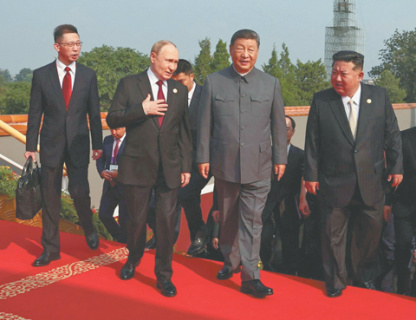
In a powerful display of deepening ties, Russian President Vladimir Putin and North Korean leader Kim Jong Un met in Beijing, using the city’s 80th-anniversary celebrations of the end of World War II as a backdrop to reaffirm their strategic alignment. The summit, hosted by Chinese President Xi Jinping, signaled a coordinated effort by the three nations to bolster their partnership in the face of what they perceive as mounting pressure and isolation campaigns led by the United States and its allies.
During the talks, President Putin described the relationship between Moscow and Pyongyang as having evolved into a “special, trust-based, and allied character.” In a striking affirmation of this partnership, he highlighted the participation of North Korean special forces in military operations within Russia’s Kursk region. This meeting solidified the strategic partnership treaty signed last year, transforming diplomatic rhetoric into tangible military and political cooperation.
For over two decades, Western accusations have centered on North Korea’s clandestine nuclear weapons program, a clear violation of UN resolutions. The recent gathering in Beijing drew sharp commentary from the West, with former U.S. President Donald Trump accusing the three leaders of “plotting against America,” though he paradoxically also referred to them as his friends. This summit served to defy such pressure, showcasing a united front that challenges the existing global power structure.
For Kim Jong Un, the visit to China—his first in six years—marked a resounding diplomatic victory. It shattered the Western narrative of North Korea as an isolated pariah state. By engaging directly with the leaders of Russia and China, Kim demonstrated his country’s significant role on the international stage and its ability to maintain powerful allies, effectively neutralizing efforts to sideline him.
China also emerged from the high-profile events with its international standing significantly enhanced. The military parade in Beijing was not merely a display of new weaponry but a testament to its growing global influence. As noted by The New York Times, the summit confirmed that for more than two dozen countries, China has become a more reliable diplomatic partner than the United States, cementing its status as a central player in a re-aligning world order.
Amid the major power politics, a notable development occurred on the Korean Peninsula. In a rare and symbolic gesture, Kim Jong Un exchanged a handshake and held a brief conversation with Woo Won-shik, the speaker of South Korea’s National Parliament. This interaction is particularly significant given that South Korea’s new president, Lee Jae-myung, has advocated for de-escalation and dialogue with Pyongyang, a departure from his more conservative predecessor.
While Pyongyang has historically dismissed Seoul’s peace overtures as disingenuous due to the U.S. military’s presence in the South, this brief meeting offered a glimmer of hope. Woo reportedly raised the deeply emotional issue of reuniting families separated by the 1950-1953 Korean War—a personal matter for many, including the speaker himself, who has sisters living in the North. While it remains uncertain if this will lead to a genuine thaw, the contact itself is a remarkable step.
Further cementing these burgeoning alliances, Russia and North Korea have also expanded their cooperation into law enforcement. Russian Interior Minister Vladimir Kolokoltsev and North Korean Minister of Public Security Pang Tu Sop signed an agreement in Moscow to jointly combat drug trafficking, human trafficking, and terrorism, demonstrating a practical, operational dimension to their deepening strategic relationship.
